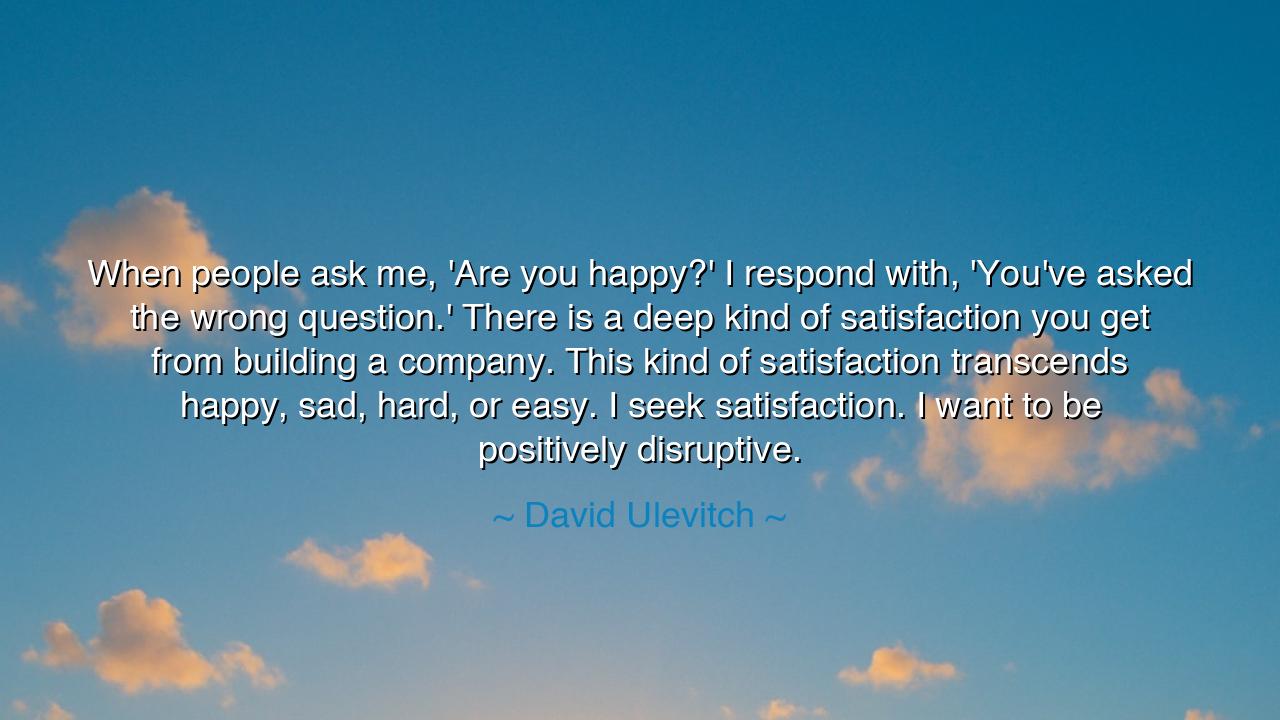
When people ask me, 'Are you happy?' I respond with, 'You've
When people ask me, 'Are you happy?' I respond with, 'You've asked the wrong question.' There is a deep kind of satisfaction you get from building a company. This kind of satisfaction transcends happy, sad, hard, or easy. I seek satisfaction. I want to be positively disruptive.






Hear now the words of David Ulevitch, a builder of enterprises and a seeker of purpose: “When people ask me, ‘Are you happy?’ I respond with, ‘You’ve asked the wrong question.’ There is a deep kind of satisfaction you get from building a company. This kind of satisfaction transcends happy, sad, hard, or easy. I seek satisfaction. I want to be positively disruptive.” In these words, there is a profound teaching, one that cuts to the very marrow of human striving. He speaks not of fleeting moods, which rise and fall like waves upon the shore, but of the deeper current that flows beneath—the enduring satisfaction of creating something lasting.
For what is happiness but a momentary spark, bright yet fragile, easily extinguished by the winds of hardship? The ancients taught that to pursue happiness alone is to chase shadows. It is here, in Ulevitch’s declaration, that we find a higher truth: that satisfaction comes not from ease or comfort, but from toil, endurance, and the shaping of vision into reality. To build is to wrestle with chaos, to endure setbacks, to labor through days that are neither sweet nor easy—and yet, when the work stands complete, it grants a fulfillment that no passing delight can equal.
History offers us shining examples. Consider the life of Thomas Edison, who through countless failures and sleepless nights, brought forth the electric light. Was he always happy? Surely not. Frustration and exhaustion walked beside him daily. But in the end, there was satisfaction—a satisfaction not dependent on mood, but rooted in the knowledge that his creation reshaped the world. Such satisfaction is timeless, a flame that burns beyond the boundaries of joy and sorrow.
Ulevitch speaks also of being positively disruptive. To disrupt is to challenge the order of things, to refuse stagnation, to strike boldly against the complacency of “how it has always been.” But his aim is not destruction—it is transformation. The wise know that every age requires such disruptors: Moses who shattered Pharaoh’s order to bring freedom; Galileo who challenged the heavens themselves to reveal truth; innovators and leaders who bear scorn in their time, but whose courage builds the pillars of the future. Positive disruption is the seed of progress, and only those who seek satisfaction beyond comfort can endure the cost of planting it.
Thus the lesson is clear: do not waste your life chasing happiness as though it were a golden bird forever fleeing your grasp. Instead, seek satisfaction, the deep strength that comes from purpose. Work not only for pleasure, but for meaning. Build, create, challenge, and endure, and you will find that joy comes as a companion, even if not as the master. To be merely “happy” is to float; to be satisfied is to stand upon rock.
What then must you do? Ask yourself not, “Am I happy?” but rather, “Am I building something worthy? Am I moving the world forward, even a little?” Set your sights on tasks that outlast you—on work that bears fruit for others as well as yourself. When hardship comes, remember that it does not rob you of your quest; it is the very fire that tempers your spirit and makes your satisfaction deeper.
And so, the teaching endures: happiness is a guest, but satisfaction is a home. The wise do not chase passing moods, but anchor themselves in work that matters, in disruption that heals, in creation that endures. If you would live greatly, do not seek the fleeting pleasure of comfort—seek instead the profound satisfaction of purpose. For it is this, and this alone, that will echo beyond your days and make your life a song worth remembering.






AAdministratorAdministrator
Welcome, honored guests. Please leave a comment, we will respond soon